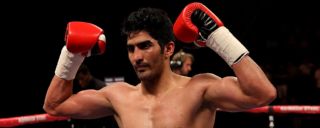|
Now that he has left the relative safety of the amateur system, Vijender Singh only needs to be a decent fighter to become a sporting giant, icon and true hero in India. Singh was the first Indian to win a boxing medal at the Olympics and when he returned in splendour and triumph from Beijing, with the bronze medal, he alternated between walking on water and crushed red rose petals. He could do no wrong. He also won a bronze at the 2009 World championships and silver, bronze and silver at three consecutive Commonwealth Games, ending last year with defeat in the middleweight final in Glasgow to Liverpool's Antony Fowler. He is India's greatest male boxer and a few weeks ago he slipped free of the vest and won his debut as a pro in Manchester -- against England's Sonny Whiting. In 2010 he won the Asian championship and that means he beat off the best from Uzbekistan and Kazakhstan; Singh has only lost to the elite amateurs -- add Cubans to the list -- during the last ten years. His appeal in India is vast and that is because he has a classic tale of poverty, real poverty, as a harsh backdrop to his success. "There is much expectation whenever I fight," Singh said. "There is pressure, yes, and there is pride in what I do in the boxing ring. I will not let my fans down, I owe it to them." When he talks about his "people" he is not talking about his entourage, he's talking about a nation. Singh has alternated between fighting overseas a dozen times each year in the world's hardest tournaments and serving in the police force. He is still a deputy superintendent for the Haryana police, an area with a population in excess of 25 million people in the north of India. His first pro fight was watched by more than 30 million people in India. He has also been in a variety of Bollywood films, cast as the open-faced nice guy, a boxer or a policeman in the vivid colours and easy plots of the Indian film machine. He has been down the catwalk, on the red carpet, honoured with awards and even taken a swipe at the dominance of cricket. He's brave on both sides of the ropes. There was another Indian policeman once in the British boxing business. He never had Singh's deep amateur credentials but he could whack and he was a heavyweight. He got Frank Maloney, as Kellie was known then, very excited one night at York Hall in London's Bethnal Green back in the summer of 1996. He was known as Raj Kumar Sangwan, but I helped Maloney add the Sugar bit before his first fight. It turned out to be his only fight and after a disappointing win on points over four rounds against Gary Williams, Sugar Raj was packed back to Delhi. Williams, you see, had lost 20 at that point and anybody with any ambition had stopped him. Singh is a much better fighter than Sugar Raj, trust me. He fights again on November 7 in Dublin and he will be in exciting fights. Buncey's Vaults What a time for heavyweights it was in the winter of 1995. "On November 4, in Las Vegas, Mike Tyson will meet Buster Mathis Jr between 7 and 7.30pm local time, and from 8 to 10, former undisputed champions Evander Holyfield and Riddick Bowe will meet over 12 rounds." Frank Bruno was the WBC champion at the time and everybody wanted to get to him. However he had options. "If the WBC decide to grant Bruno a voluntary fight, he could meet former double champion Tim Witherspoon early next year. Bruno should thus obtain revenge, for in 1986 Witherspoon rallied from certain defeat to stop Bruno in the 11th round." Lennox Lewis, another former champion, was also in the crazy mix. "Lewis also has the option of chasing Bowe or Holyfield, or possibly even Michael Moorer, provided he beats George Foreman, as an alternative to meeting Bruno." Whew, madness. This is what happened: Tyson pulled out with about 48-hours to go, Bowe survived a brutal knockdown to knockout Holyfield, Moorer never got a rematch with Foreman and Lewis never met Bowe. It has always been a crazy division in a lunatic sport! As reported in the Daily Telegraph on October 13, 1995
|

